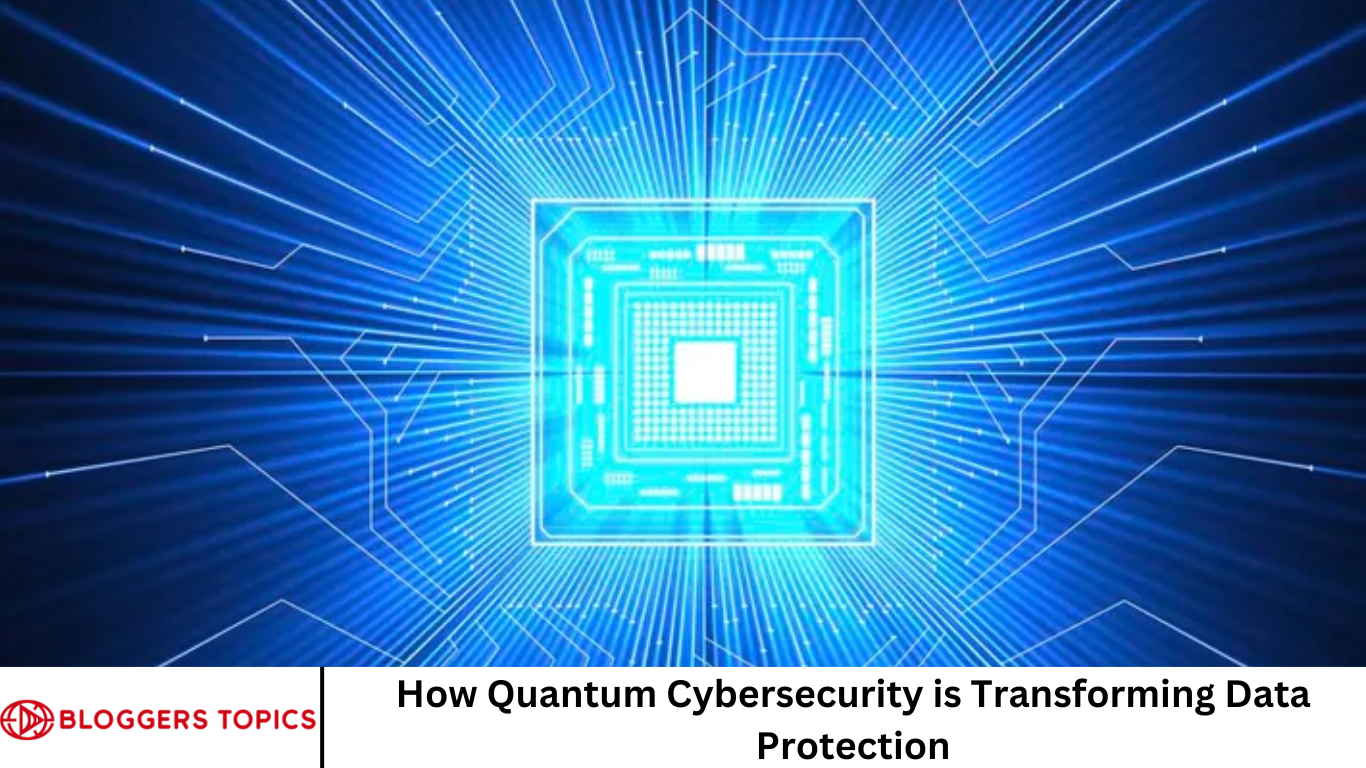Digital landscape, cybersecurity is paramount. As we continue to experience rapid technological advancements, a new frontier in the world of cybersecurity is emerging: quantum computing. This revolutionary technology is set to reshape data protection in ways we’ve never seen before.
While quantum computing promises to solve complex problems, it also brings new challenges to data security. This article explores how quantum cybersecurity is transforming the way we protect data, the risks posed by quantum computing, and the steps businesses can take to stay ahead of the curve.
More Read: Building an Affordable Smart Home: A Step-by-Step Guide
What is Quantum Computing?
Before diving into its impact on cybersecurity, it’s important to understand what quantum computing is. Unlike classical computers that use bits to represent data as either 0 or 1, quantum computers use quantum bits, or qubits.
These qubits can exist in multiple states simultaneously, thanks to a principle known as superposition. Additionally, qubits can be entangled, meaning that the state of one qubit is directly tied to the state of another, even if they are separated by vast distances. These unique properties give quantum computers the potential to solve problems that are currently beyond the reach of even the fastest supercomputers.
The Quantum Computing Revolution
Quantum computing is not just theoretical anymore. Major tech companies like IBM, Google, and Microsoft have made significant strides in developing quantum processors. In fact, Microsoft’s announcement of the Majorana 1 quantum processor in February 2025, which uses more stable topological qubits, has brought the technology one step closer to practical application.
These developments signal that quantum computing could soon be capable of solving problems in fields such as cryptography, materials science, and artificial intelligence in a fraction of the time it would take current technologies.
However, as quantum computing evolves, it also presents new risks to data security. The ability of quantum computers to break existing encryption methods could leave sensitive data vulnerable to malicious attacks, potentially compromising everything from personal information to national security data. This has led to the rise of quantum cybersecurity as a critical field in the fight to protect data.
The Intersection of Quantum Computing and Cybersecurity
Quantum computing’s impact on cybersecurity is significant because of its potential to break widely used encryption algorithms. Current encryption protocols, such as RSA encryption and ECC (Elliptic Curve Cryptography), rely on the computational difficulty of solving complex mathematical problems.
For example, RSA encryption secures data by making it difficult to factor large prime numbers, a task that classical computers struggle with. However, a sufficiently powerful quantum computer could solve these problems in seconds, rendering these encryption methods obsolete.
The main threat posed by quantum computing to cybersecurity is its ability to break asymmetric encryption algorithms. These algorithms, which are used to secure everything from online banking transactions to secure communication systems, depend on the difficulty of certain mathematical problems.
Quantum algorithms, like Shor’s algorithm, can solve these problems exponentially faster than classical algorithms. This makes quantum computers a significant threat to the cryptographic systems that protect much of today’s digital infrastructure.
The Rise of Post-Quantum Cryptography (PQC)
As quantum computing becomes more powerful, the cybersecurity community is working to develop new cryptographic algorithms that can withstand the power of quantum computers. This field is known as post-quantum cryptography (PQC), and its goal is to create encryption methods that are secure against both classical and quantum attacks.
Post-quantum cryptography is essential for ensuring that the data we rely on today remains secure in the quantum age. Unlike current encryption methods that would be easily broken by a quantum computer, PQC algorithms are designed to be resistant to quantum-based attacks. These algorithms are based on mathematical problems that are difficult for both classical and quantum computers to solve.
Some of the most promising post-quantum algorithms include:
- Lattice-based cryptography: Lattice-based cryptographic schemes rely on the hardness of problems related to mathematical lattices. These algorithms are believed to be resistant to quantum attacks and are considered one of the most promising areas in PQC research.
- Code-based cryptography: Code-based cryptographic algorithms use error-correcting codes to secure data. These codes are resistant to attacks from both classical and quantum computers, making them a strong candidate for future encryption systems.
- Multivariate polynomial cryptography: This approach involves solving systems of multivariate polynomial equations, a problem that is believed to be hard for both classical and quantum computers. Multivariate polynomial-based schemes are another area of focus for post-quantum cryptography.
- Hash-based cryptography: Hash-based signatures are a form of digital signature that uses hash functions to ensure data integrity. These are also considered to be quantum-resistant and are one of the oldest types of post-quantum algorithms.
As researchers continue to refine these algorithms, it is expected that post-quantum cryptography will become the standard for securing sensitive data in the quantum era.
Quantum Key Distribution (QKD) and Data Protection
One of the most promising developments in quantum cybersecurity is Quantum Key Distribution (QKD). QKD uses the principles of quantum mechanics to securely share encryption keys between two parties. Unlike classical key distribution methods, QKD is theoretically immune to eavesdropping. This is because, in quantum mechanics, observing a quantum system alters its state.
If an eavesdropper tries to intercept a quantum key, their presence would be detected, and the key would be discarded. QKD is already being implemented in some high-security networks, particularly for government and financial institutions.
The ability to securely distribute encryption keys without the risk of interception has the potential to revolutionize data protection. However, widespread adoption of QKD is still limited by the need for specialized hardware and the challenges of transmitting quantum signals over long distances. Despite these challenges, QKD is an important component of the future of quantum cybersecurity.
It offers an unprecedented level of security for data transmission, ensuring that even in a world dominated by quantum computers, sensitive information can remain secure.
The Role of Quantum Cryptanalysis
As quantum computing advances, cybersecurity experts must also be prepared for quantum cryptanalysis—the process of analyzing cryptographic systems using quantum computers. Quantum cryptanalysis is a growing field focused on understanding how quantum computers can be used to break existing encryption schemes.
While post-quantum cryptography aims to develop new algorithms that can resist quantum attacks, it’s equally important to anticipate how quantum computers might be used to crack current encryption methods. This has led to increased efforts to study the impact of quantum cryptanalysis on existing cryptographic systems and develop defensive strategies to mitigate potential risks.
Quantum cryptanalysis could also lead to new techniques for improving encryption methods. By understanding the limitations of current systems in the face of quantum threats, cryptographers can design more robust encryption algorithms that can withstand both classical and quantum attacks.
Preparing for the Quantum Era: Steps Businesses Should Take
As the quantum era approaches, businesses must begin preparing for the potential disruption caused by quantum computing. While the technology is still in its early stages, the risks are real, and the time to act is now. Here are some steps businesses can take to safeguard their data:
Adopt Post-Quantum Cryptography
The first step is to begin implementing post-quantum cryptography (PQC) algorithms in critical systems. These algorithms will provide protection against future quantum attacks, ensuring that data remains secure even after quantum computers become widely available. While PQC is still evolving, early adoption will give businesses a head start in preparing for the quantum future.
Monitor Quantum Developments
Quantum computing is advancing rapidly, and businesses must stay informed about the latest developments in the field. By monitoring the progress of quantum research and the emergence of new quantum-resistant algorithms, companies can ensure they are ready to adapt to changing cybersecurity needs.
Collaborate with Quantum Experts
As quantum cybersecurity is a specialized field, it’s essential for businesses to work closely with experts in quantum computing and cybersecurity. Collaborating with these professionals can help organizations better understand the risks posed by quantum computers and develop strategies for mitigating them.
Implement Quantum Key Distribution (QKD)
For organizations with high-security needs, implementing Quantum Key Distribution (QKD) can provide an additional layer of protection. QKD ensures secure key exchange without the risk of interception, offering a powerful tool for protecting sensitive data.
Prepare for Quantum Cryptanalysis
Businesses should also be aware of the potential for quantum cryptanalysis and take steps to understand how their encryption systems might be affected by quantum attacks. This may involve regular security audits and updates to ensure that cryptographic systems are ready for the quantum era.
Frequently Asked Question
What is quantum cybersecurity?
Quantum cybersecurity refers to the field of cybersecurity that uses quantum computing principles to protect data and communications. It involves developing quantum-resistant encryption methods (post-quantum cryptography) and leveraging quantum technologies like Quantum Key Distribution (QKD) to secure data against potential attacks from future quantum computers.
How does quantum computing affect current encryption methods?
Quantum computing poses a significant threat to existing encryption methods like RSA and ECC (Elliptic Curve Cryptography). Quantum computers can use algorithms like Shor’s algorithm to break these encryption methods much faster than classical computers, making traditional encryption methods vulnerable to attack.
What is post-quantum cryptography (PQC)?
Post-quantum cryptography refers to encryption algorithms that are designed to be resistant to attacks by quantum computers. These algorithms are based on mathematical problems that are difficult for both classical and quantum computers to solve, ensuring data security even in the quantum era.
What is Quantum Key Distribution (QKD) and how does it work?
Quantum Key Distribution (QKD) is a method of securely exchanging encryption keys using the principles of quantum mechanics. QKD ensures that any attempt to intercept or eavesdrop on the key exchange process would alter the quantum state, making the intrusion detectable. This offers a high level of security for data transmission.
Why is quantum cybersecurity important for businesses?
As quantum computers advance, businesses need to prepare for the eventual shift in cybersecurity standards. Adopting quantum-resistant encryption methods and quantum technologies will ensure that sensitive data remains protected against the threat of quantum-powered attacks, safeguarding business operations and customer trust.
How can businesses prepare for the quantum computing threat?
To prepare for quantum threats, businesses should start adopting post-quantum cryptography, monitor advancements in quantum computing, and consider integrating Quantum Key Distribution for secure key management. Staying informed and working with quantum computing experts will help businesses adapt their cybersecurity practices ahead of the quantum revolution.
When will quantum computers be powerful enough to break encryption?
While we are still in the early stages of quantum computing, developments are progressing rapidly. Some experts predict that within the next decade or two, quantum computers may have the capability to break traditional encryption methods. Preparing now by adopting quantum-resistant encryption will ensure that organizations stay ahead of these potential threats.
Conclusion
Quantum computing holds immense promise, but it also presents significant challenges for cybersecurity. As quantum computers become more powerful, traditional encryption methods will become obsolete, and businesses must prepare for the impact of this new technology. By adopting post-quantum cryptography, implementing quantum key distribution, and staying informed about developments in quantum cryptanalysis, organizations can protect their data and ensure they are ready for the future of cybersecurity.







